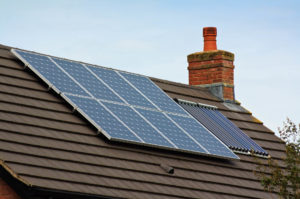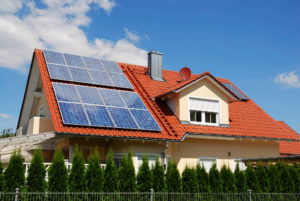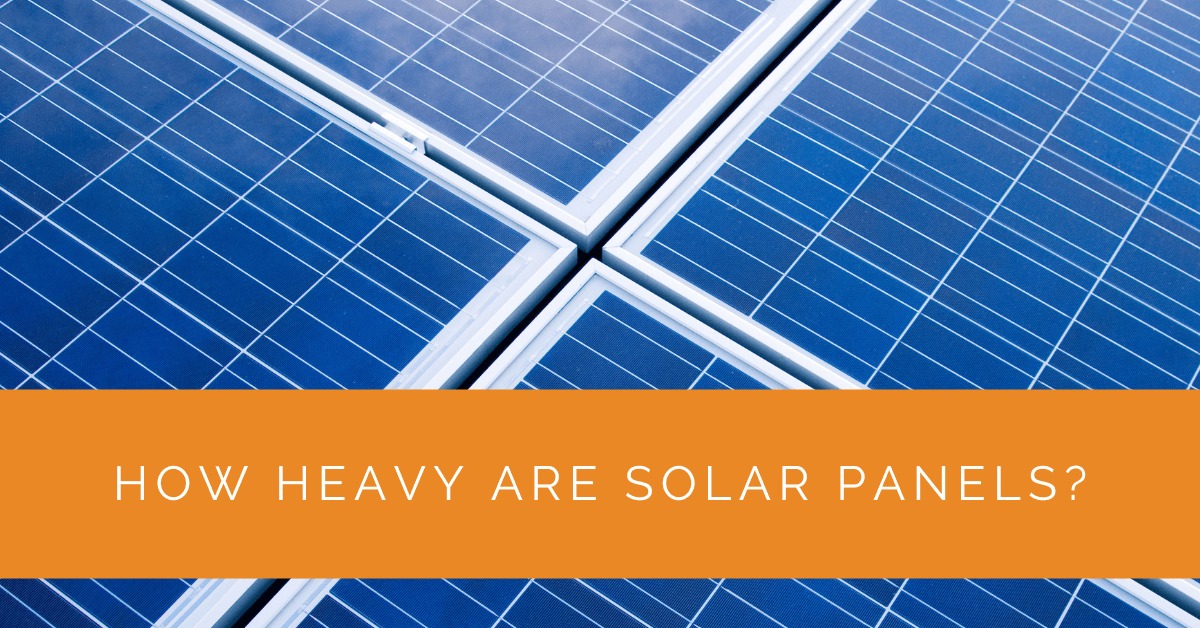Solar panels have become an increasingly popular choice for harnessing clean and sustainable energy from the sun. However, before you embark on a residential solar installation or a commercial solar panel system, it’s crucial to understand how much weight these solar panels add to your roof and how various factors can influence their size and weight.
Contents
- 1 Key Takeaways
- 2 Factors That Determine Solar Panel Size
- 3 Weight of Solar Panels
- 4 How Much Weight Do Solar Panels Add to a Roof?
- 5 Solar Panel Dimensions
- 6 Support for a Solar Panel System
- 7 Weight of Snow and Its Impact
- 8 Case Study: Ensuring Structural Integrity for Solar Panel Installations
- 9 Expert Insights From Our Solar Panel Installers About How Heavy Solar Panels Are
- 10 Experience Solar Excellence with Us!
- 11 Conclusion
Key Takeaways
- Understanding the factors determining the size and weight of solar panels is crucial when planning a solar panel installation, whether for residential or commercial purposes.
- Proper roof assessment and support are essential to ensure the structural integrity of your roof when installing solar panels, including load distribution and, in some cases, consultation with a structural engineer.
- In snowy regions, monitoring and managing the added weight of snow on your solar panels is vital to prevent potential stress on your roof and ensure the long-term efficiency of your solar energy system.
Factors That Determine Solar Panel Size
When considering the installation of solar panels, one of the primary considerations is understanding the factors that influence the size of the panels you’ll need for your residential or commercial solar installation. Let’s delve deeper into these key determinants:
Solar Energy Needs
The energy needs of your home or business are a pivotal factor in determining the size of your solar panel system. Residential solar panel systems are typically designed to meet the energy demands of households, while commercial solar systems cater to larger-scale energy requirements. If your goal is to produce a significant portion of your energy consumption, it may necessitate a larger solar panel system with more panels to generate the desired power output.
Space Availability
The available roof space plays a significant role in the size of your solar panel installation. Solar panels come in various sizes and configurations, and the amount of space you can allocate for them will determine the overall size of your solar array. Smaller residential roofs may have space constraints, requiring careful consideration of panel dimensions and arrangement.
Solar Cell Technology
Solar panel technology has evolved, resulting in various panels with different cell technologies. For instance, 72-cell solar panels are known for their larger size and increased energy output. Choosing the right cell technology for your installation can influence the dimensions and weight of your solar panels.
Solar Panel Efficiency
The efficiency of solar panels is a vital factor in determining size. More efficient panels can generate the same amount of energy in a smaller footprint, which can affect the overall weight of the solar panel system. Consider selecting high-efficiency panels to optimize energy production without significantly increasing the size or weight of the installation.

Weight of Solar Panels
Understanding the weight of solar panels is crucial when planning a solar panel installation. The weight of solar panels can vary based on several factors, including their size, type, and technology. Here, we explore these aspects in greater detail:
Residential Solar Panels
Typically, residential solar panels weigh between 33 and 50 pounds each. However, it’s important to remember that this weight is distributed across the entire surface area of the panel. As a result, the pounds per square foot (PSF) load imposed on your roof is relatively low, making them suitable for most residential roofs. The manageable weight of residential solar panels ensures they can be easily integrated into existing residential structures.
Commercial Solar Panels
Commercial solar panels, conversely, tend to be larger and heavier than their residential counterparts. Their weight can range from 50 to 75 pounds per panel. Given their size and weight, special considerations are necessary to ensure adequate roof support when installing commercial solar panels. This includes structural assessments and reinforcement measures to accommodate the added load.
How Much Weight Do Solar Panels Add to a Roof?
Calculating the additional weight solar panels introduce to your roof is pivotal in ensuring a successful installation. Let’s delve further into this aspect, considering both residential and commercial scenarios:
For example, envision installing 20 residential solar panels, each weighing 40 pounds. The total weight calculation would be:
Total Weight = Number of Panels × Weight per Panel
Total Weight = 20 panels × 40 pounds = 800 pounds
This weight must be distributed evenly across the roof to prevent localized stress points or structural issues. Most roofs are designed to accommodate such additional loads. Still, it’s always advisable to consult with a structural engineer or a solar installation professional to confirm that your roof can safely support the weight of the solar panel system. Ensuring proper distribution and support will guarantee the long-term stability of your solar installation.
Solar Panel Dimensions
Solar panel dimensions are a significant consideration when determining the size and layout of your solar panel system. Let’s explore these dimensions and their implications in more depth:
A standard residential solar panel typically measures approximately 65 inches in length and 39 inches in width. The total area covered by a single residential solar panel is approximately 17.5 square feet. These dimensions are fundamental to understanding how many panels will fit on your roof and how they will be arranged.
The size of solar panels not only affects their weight but also influences the overall design and efficiency of your solar panel installation. Larger panels may reduce the overall number required to meet your energy needs, impacting the weight distribution across your roof. Careful consideration of panel dimensions is essential to optimize energy production while maintaining structural integrity.

Support for a Solar Panel System
Ensuring proper roof support for your solar panel system is a critical aspect of the installation process. Here, we delve further into the factors to consider when assessing and reinforcing your roof’s structural support:
Roof Assessment
Before installing solar panels, it’s prudent to have a professional roofer assess the condition of your roof. Any necessary repairs or reinforcements should be carried out to ensure that your roof can safely support the additional weight of the solar panel system. A sound roof foundation is essential for the long-term stability of your solar installation.
Load Distribution
Efficient load distribution is key to preventing localized stress on your roof structure. When working with your solar installer, ensure that the weight of the solar panels is evenly distributed across your roof’s structural supports. Proper distribution minimizes the risk of damage or strain on specific areas.
Structural Engineering
Consulting with a structural engineer may be advisable in some cases, especially with larger or commercial solar installations. Their expertise can be invaluable in assessing your roof’s current capacity and implementing any necessary reinforcements to safely accommodate the solar panel system.
Weight of Snow and Its Impact
In regions where snowfall is common, understanding the impact of snow on your solar panels is essential. Here, we explore the added weight of snow and its potential consequences:
During snowy periods, it’s important to consider the added weight of snow accumulation on your solar panels. Snow can significantly increase the load on your roof. On average, the weight of snow can be approximately 20 pounds per cubic foot, depending on its moisture content. This additional weight can pose structural challenges for your roof and solar panel system.
To mitigate these concerns, monitoring your solar panels during snowy conditions and removing snow when necessary can help prevent excessive stress on your roof. Proper maintenance ensures your solar panel system’s effectiveness and safeguards your roof structure’s integrity.
Case Study: Ensuring Structural Integrity for Solar Panel Installations
Background
Solar Panels Network USA is committed to delivering sustainable solar solutions while ensuring the structural safety of our clients’ properties. This case study highlights our approach to addressing the weight considerations of solar panel installations for a residential client in a snowy region.
Project Overview
Our client, a homeowner in a region with significant snowfall, sought to install a residential solar panel system. They were concerned about the additional weight the panels and accumulated snow would place on their roof. Our objective was to ensure a safe and efficient installation that addressed these concerns.
Implementation
Initial Assessment
We began with a comprehensive roof assessment to evaluate its current condition and load-bearing capacity. This involved inspecting the roof for any pre-existing damage and assessing the structural integrity to determine if any reinforcements were needed.
System Design
Based on the assessment, we designed a solar panel system that included 20 high-efficiency panels, each weighing 40 pounds. We calculated the total weight of the system and planned for even distribution across the roof to prevent localized stress points.
Installation Process
- Site Preparation: Our team ensured that the roof was in optimal condition before installation, making any necessary repairs and reinforcing weak areas.
- Panel Installation: The solar panels were securely mounted on the roof, with careful attention to distributing the weight evenly. We used specialized mounting hardware to ensure stability and durability.
- Snow Load Considerations: Given the region’s heavy snowfall, we factored in the additional weight of snow. We estimated that snow accumulation could add approximately 20 pounds per cubic foot, significantly increasing the load. To mitigate this, we installed a monitoring system to alert the homeowner when snow removal was necessary to prevent excessive weight on the roof.
Results
The installation was completed successfully, with the solar panel system operating efficiently and safely. The client reported significant energy savings and was reassured by the system’s stability and performance during the winter months. The proactive measures for snow load management ensured that the roof and solar panels remained secure and undamaged.
Summary
By addressing the weight considerations and potential impact of snow, Solar Panels Network USA provided a tailored solution that ensured the structural integrity and efficiency of the client’s solar panel system. This project highlights the importance of thorough assessments, proper load distribution, and proactive maintenance in achieving a successful solar installation. Our commitment to safety and sustainability ensures that our clients can harness the power of solar energy with confidence.
Expert Insights From Our Solar Panel Installers About How Heavy Solar Panels Are
Understanding the weight of solar panels is essential for ensuring the structural integrity of your roof. Each residential solar panel typically weighs between 33 and 50 pounds, which is manageable for most roofs with proper load distribution.
Senior Solar Engineer
Commercial solar panels are generally larger and heavier, often ranging from 50 to 75 pounds. This added weight necessitates a thorough structural assessment to ensure the roof can safely support the system.
Solar Installation Specialist
Proper load distribution and roof reinforcement are critical when installing solar panels, especially in areas with heavy snowfall. Consulting with a structural engineer can help address any potential concerns and ensure a safe installation.
Chief Structural Consultant
Experience Solar Excellence with Us!
Trust in Solar Panels Network USA, where our seasoned experts deliver top-quality solar solutions for homes and businesses nationwide. With a legacy of countless successful installations and a commitment to sustainable energy, we’re your reliable partner in the solar journey. Ready for a brighter, eco-friendly future? Call us now at (855) 427-0058 and harness the power of the sun!
Conclusion
Understanding the various factors that influence the size and weight of solar panels and their impact on your roof’s structural integrity is paramount when considering a solar panel installation. Whether you opt for residential solar panels or commercial solar systems, comprehensive knowledge, and careful planning are essential for a successful and sustainable solar energy solution. Considering solar panel dimensions, load distribution, and structural support, you can harness the sun’s power while safeguarding your investment’s longevity. Always seek professional guidance to tailor your solar installation to your needs and circumstances, ensuring long-term environmental and structural benefits.
About the Author
Solar Panels Network USA stands at the forefront of solar energy solutions, driven by a team of seasoned solar engineers and energy consultants. With over decades of experience in delivering high-quality solar installations and maintenance, we are committed to promoting sustainable energy through customer-centric, tailored solutions. Our articles reflect this commitment, crafted collaboratively by experts to provide accurate, up-to-date insights into solar technology, ensuring our readers are well-informed and empowered in their solar energy decisions.

